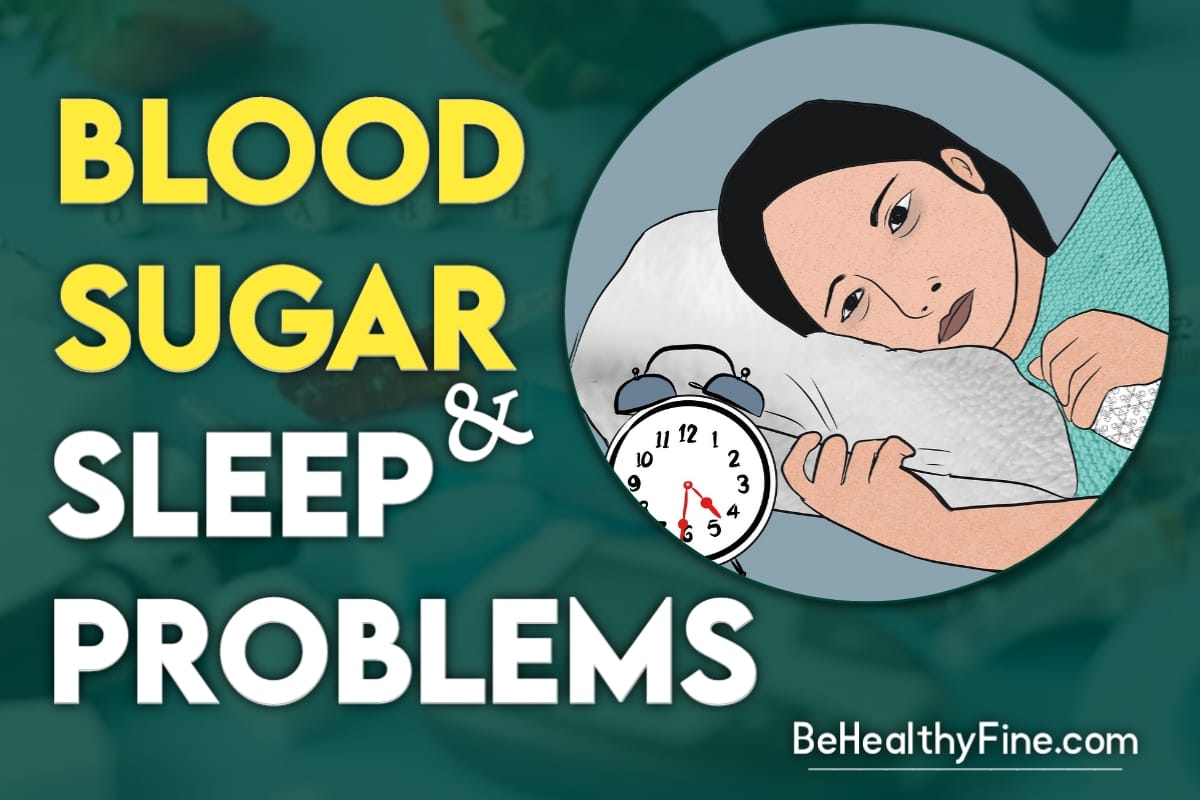Sleep is very important for our health. It keeps our body and mind healthy and strong. But many people face difficulties to sleep well at night.
People often talk about stress and habits affecting sleep, but many people don’t know that blood sugar levels can also play a big role. In this Article, we will talk about Blood Sugar And Sleep Problems and some easy tips for better sleep Full Night.
Understand Blood Sugar and Sleep
To understand how blood sugar affects sleep, let’s first look at how our body handles sugar. When we eat, food is broken down into a sugar called glucose, which gives us energy. Insulin, a hormone made by the pancreas, helps to move this sugar into cells for energy.
But sometimes, the balance can change, which can make blood sugar levels go up and down. Eating too many sugary foods can cause blood sugar to rise rapidly and then drop rapidly.
This rollercoaster ride can disturb our sleep. Also, conditions like diabetes can cause high blood sugar levels, which also impacts sleep. Therefore, it is important to keep our blood sugar stable to get good sleep.
Blood Sugar And Sleep Problems
These Fluctuations in blood sugar levels can seriously affect sleep. Low blood sugar can cause sweating and nightmares, while high blood sugar can lead to thirst and discomfort, making it hard to sleep well.
These ups and downs in blood sugar can disrupt sleep patterns and reduce overall sleep quality.
1. Hypoglycemia (Low Blood Sugar):

When your blood sugar gets too low, especially while you’re sleeping, it can cause some uncomfortable symptoms. You might wake up feeling sweaty, with your heart beating fast, or even scared from a bad dream.
Your body reacts to low blood sugar by releasing stress hormones like adrenaline, which can make things worse and mess up your sleep even more. So, you might end up sleeping badly and waking up feeling tired and not rested.
2. Hyperglycemia (High Blood Sugar):
When your blood sugar stays high, especially at night, it can cause issues. You might have to pee a lot, feel super thirsty, and just feel uncomfortable overall, making it hard to fall asleep and stay asleep.
Also, having high blood sugar messes with your body’s hormones, like cortisol and growth hormone, which are important for sleep. So, even if you do fall asleep, it might not be the restful sleep your body needs to fully recharge. [Great Solution for Diabetes]
3. Sleep Architecture Disruption:
When your blood sugar levels go up and down a lot, it can mess with how you sleep. Your sleep might become all choppy, with you waking up a lot during the night. This kind of disruption doesn’t let your body and mind get the deep rest they need.
As a result, you might feel tired and grumpy during the day, and your thinking and mood might not be as sharp as usual. So, it’s not just about how long you sleep, but also about how well you sleep, to keep your body and mind healthy and strong.
Related Article : How to Maintain a Healthy Blood Sugar Level
Related Article : Healthy Breakfast for Type 2 Diabetes
4. Sleep Disorders:
Health issues like diabetes, where blood sugar levels go up and down a lot, often lead to sleep problems.
These problems can include things like sleep apnea, where you stop breathing for a bit while you sleep, restless legs syndrome, which makes your legs feel tingly and jumpy, and insomnia, where you have trouble falling asleep or staying asleep. When these sleep problems happen along with unstable blood sugar levels, they can make each other worse.
It’s like a cycle – bad sleep makes blood sugar harder to control, and unstable blood sugar makes it harder to sleep well. So, it’s really important to manage both your blood sugar and your sleep for your overall health. [Great Solution for Diabetes]
Strategies for Better Sleep and Blood Sugar Management:
Luckily, there are many ways you can use to make both your blood sugar levels and sleep quality better we will share 5 Simple strategies here that you can follow for better sleep and overall well-being
1. Maintain a Balanced Diet

Eating the right foods is super important for keeping your blood sugar stable and getting good sleep. It’s best to eat lots of whole foods like fruits, vegetables, and whole grains. Don’t forget to add lean proteins and healthy fats to your meals too.
Fruits and Vegetables for Blood Sugar and Sleep Problems:
Some fruits and vegetables are particularly beneficial for managing blood sugar levels and promoting better sleep. Examples include leafy greens like spinach and kale, berries such as blueberries and strawberries, and non-starchy vegetables like broccoli and cauliflower.
These Foods are low in sugar and high in fiber, vitamins, and minerals, These Fruits and Veggies are great options for helping both manage your blood sugar and improve your sleep.
Try to avoid sugary or high-carb foods, especially before bedtime, because they can make your blood sugar go up and down. By choosing these healthy foods, you can help your body to stay balanced and sleep better at night.
2. Regular Exercise
It’s really important to exercise regularly to keep your blood sugar in check and sleep better at Night. Exercise helps your body use insulin better and keeps your blood sugar levels steady. Try to do about 30 minutes of gentle exercise most days of the week.
But avoid doing intense workouts right before bedtime because they might make it tough to fall asleep. By staying active, you can make big improvements in your health and sleep! [Great Solution for Diabetes]
3. Monitor Blood Sugar Levels
If you have diabetes or think you might have blood sugar issues, it’s really important to check your blood sugar levels regularly. Work closely with your doctor to manage them properly. Checking your levels often helps you see any patterns and adjust your treatment plan if necessary.
This not only helps control your blood sugar but also increases your chances of getting good sleep. So, make sure to keep an eye on your health by checking regularly and getting support from your healthcare team.
4. Establish A Sleep Routine
Having a regular sleep routine is really important for getting good rest. Try to go to bed and wake up around the same time every day, aiming for 7-9 hours of sleep each night. Before bedtime, do calming activities like reading or taking a warm bath to help your body relax.
Make sure your bedroom is comfortable and quiet, with a cool temperature and no bright lights. By sticking to a consistent sleep schedule and doing relaxing activities before bed, you can make it easier to sleep well every night.
5. Limit Caffeine and Alcohol

Reducing caffeine and alcohol intake can improve both your blood sugar and sleep. Try to limit the amount of caffeine you have, especially in the afternoon and evening.
And avoid alcohol before bed time as it can mess with the quality of your sleep. By making these simple changes, you can help keep your blood sugar stable and get the restful sleep your body needs. [Great Solution for Diabetes]
Conclusion
the relationship between blood sugar and sleep problems is complex. Fluctuations in glucose levels can affect the quality and duration of your sleep. Conversely, insufficient sleep can affect your blood sugar levels.
However, there are some steps you can take to improve both aspects. It is essential to eat a healthy diet, be physically active, and prioritize sleep. If you are concerned about your blood sugar or sleep, it is best to talk to your doctor.
They can provide personalized advice to meet your specific needs. By taking control of your health, you can pave the way for better sleep and overall well-being in the long time. Thankyou for Read this Article, Dont Forget to checkout this [Great Solution for Diabetes]
-
Can High Blood Sugar Cause Sleep issues ?
Yes, having high blood sugar levels can mess up your sleep. When your blood sugar is too high, especially before bed, you might feel extra thirsty, need to pee a lot, and feel uncomfortable.
This can make it hard to fall asleep and stay asleep. Plus, high blood sugar can mess with the hormones that help you sleep well. So, it’s important to keep your blood sugar levels in check for better sleep.
-
What Is The Best Sleep aid for Diabetics ?
The best sleep aid for diabetics is maintaining stable blood sugar levels through a balanced diet, regular exercise, and medication as prescribed by your doctor.
Additionally, creating a calming bedtime routine and ensuring a comfortable sleep environment can promote better sleep. Consult with your healthcare provider for personalized advice and treatment options tailored to your needs.
-
How Many Hours Should a Diabetic Sleep ?
Diabetics, like everyone else, should aim for 7-9 hours of sleep each night. Quality sleep is important for managing blood sugar levels and overall health.
Setting a regular sleep routine and having a calming bedtime routine can make sure you get the sleep your body needs.. If you have concerns about your sleep patterns, consult with your healthcare provider for personalized advice.
-
Does Your Blood Sugar Drop When You Sleep ?
Yes, your blood sugar can drop while you sleep,
This can especially happen if you haven’t had anything to eat for some time. This drop can happen because your body continues to use glucose for energy even when you’re not eating.However, for some people, blood sugar levels may remain stable or even rise during sleep due to various factors like hormones and liver function.
-
How Does Sleep Affect Blood Sugar ?
Sleep affects blood sugar by affecting insulin sensitivity and hunger hormones. Poor sleep can lead to insulin resistance and cravings for sugary foods, which can lead to increased blood sugar.
Irregular sleep patterns also disrupt blood sugar control. Prioritizing good sleep hygiene and maintaining a consistent sleep schedule is essential to effectively manage blood sugar levels.







